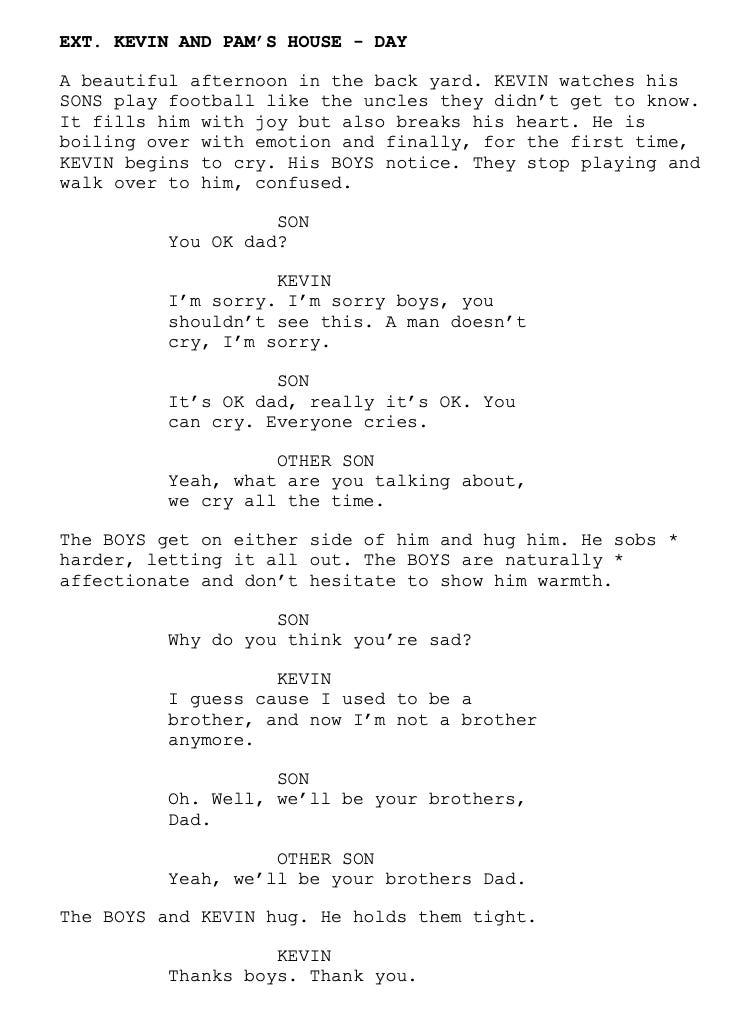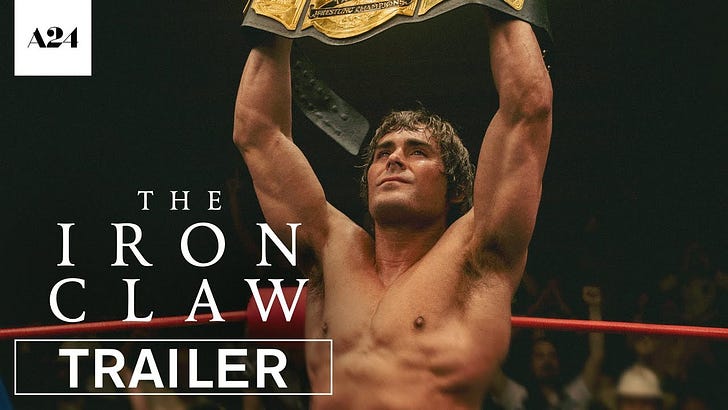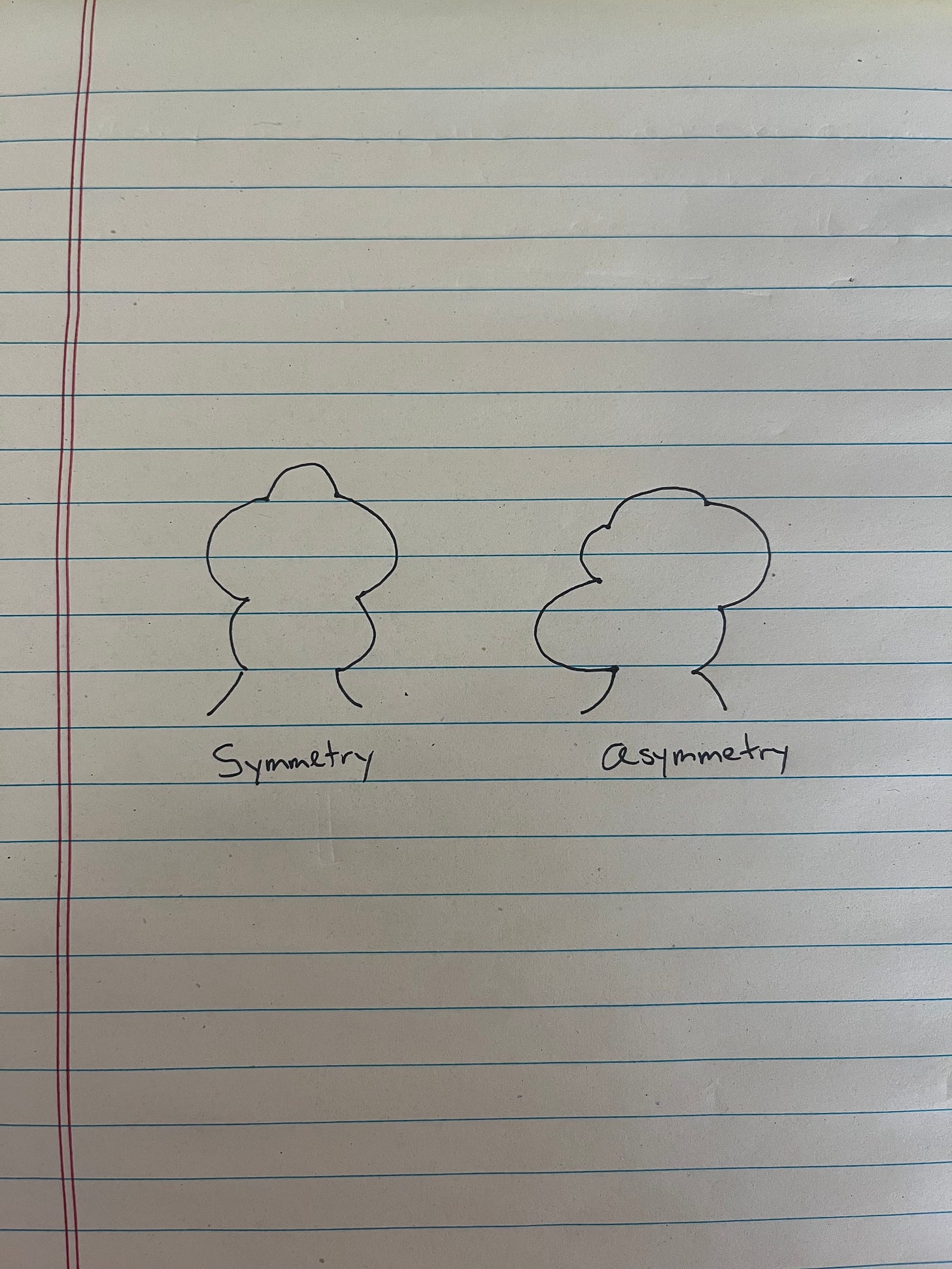WARNING: Spoiler alerts ahead for “The Iron Claw.” TW: suicide, death, family abuse
The first time my novel was workshopped in my MFA program, a guy from my class (let’s call him Fred) raised his hand. He offered a long critique of my chapter. Then, scratching his head, added, “What’s the saying again? ‘Write a dream, lose a reader.’”
The MFA world loves little aphorisms like this one: useful (?), succinct pieces of advice designed to simplify this complex pastime known as writing. In this case, Fred wasn’t saying that all dream sequences should die; he was communicating that there was a saccharine quality to my dream that was making the whole stack of pages feel unbelievable. In other words: He was calling my chapter cringe—and maybe he was right.
I’ve found that when we call writing “bad,” oftentimes, what we’re actually calling it is cheesy. There’s something in the dialogue that feels sappy, unearned, and fairytale-esque. The music swells at the exact moment when the two main characters kiss. Suddenly, we’re squirming in our seats as Ryan Gosling utters the words, “If you’re a bird, I’m a bird.” We roll our eyes. Ugh! we exclaim, the second-hand embarrassment like bad perfume hanging around us.
And yet, there are times when the cheesiness works. Lovers of The Notebook will argue that this scene with Allie and Noah is sappy yet great, suggesting that, perhaps, cheesiness occurs on a spectrum. It’s mild cheese or strong cheese or really stinky cheese. And sometimes, well, the cheese is pure magic. French cheese, you could say.
This brings me to the movie The Iron Claw. I admit that my motivations for seeing this movie were not exactly pure. I couldn’t resist the movie-star draw of Zac Efron or Jeremy Allen White (whom I endearingly call “JAW”). And yet, what this movie offers isn’t a thirst trap; it’s a story of love, fatherhood, toxic masculinity, and so much more.
A quick recap of The Iron Claw: This movie is based on the true story of the Von Erichs, a pro wrestling family of the 1980s. The four Von Erich brothers—Kevin (Zac Efron), Kerry (Jeremy Allen White), David (Harris Dickinson), and Mike (Stanley Simons)—all train and compete to become heavyweight world champions. But tragedy befalls the brothers—allegedly because of a family curse, but actually because their father is abusive, controlling, and wrestling-obsessed. Kevin is the only one who makes it out of the situation alive and with a (new) family.
The film culminates in a scene that should be absolutely cringe, but instead absolutely works—and I’m trying to figure out why. Here is the final scene:

Here, we have all the raw ingredients for a sappy scene: a father learning how to cry, kids offering heart-warming advice, and (looming offscreen) Zac Efron’s High School Musical/rom-com/bad action movie past. Yet this scene arrives like a catharsis. Like the moment you’ve been holding your breath deep in the pool and you come up for air. You gasp. You blink your eyes open. You breathe again.
I’ve spent the last week considering the mechanics of this scene. And after much thought, I have a theory about why it’s damn near perfect. I’d like to posit that it all comes down to asymmetry.
At the beginning of the movie, we see the four Von Erich brothers enjoying the hell out of each other’s company. They care about wrestling, sure, but they care about each other more. Still, their obsession with their sport and impressing their father (played by Holt McCallany) ultimately paves the road for their premature deaths.
By the end of the movie, we’ve come full circle. The script has doubled back on itself to show a not-quite-mirror image: Kevin’s brothers are gone. He has become estranged from his father. But now, his sons have the opportunity to love each other without the pressure of a father who wants them to achieve athletic perfection. There’s a slight asymmetry in the story now. An evolution that makes this scene feel so alive, so human, so earned.
A poorer writer may opt for perfect symmetry: Kevin loves his brothers. His brothers die or commit suicide because their father placed too much pressure on them. Kevin places gargantuan expectations on his own children. The cycle or “curse” begins again. The end. It’s a less compelling (and even nihilistic) story—even if, in some cases, it may be truer to life.
So what is it about the human brain that makes it love asymmetry? I couldn’t say. Perhaps we love that our main character had his heart broken and took it upon himself to protect his children’s hearts. Perhaps we wish for asymmetry and growth in our own lives, and good writing lights the way. Perhaps we just look for asymmetry in stories the way we look for symmetry in nature.
My craft takeaway? Let the asymmetries spill onto the page. Sometimes we write a dream and lose a reader. Sometimes we write a dream and stun a reader. Okay, Fred?
I’m curious: What is the best cringe-yet-perfect scene in literature or a movie that you can remember?
Reading: Strega, Johanne Lykke Holm
Writing: My novel
Watching: Poor Things, Maestro
Eating: Spaghetti squash boats
This newsletter is written and edited by me, so please excuse the occasional grammatical error or spelling gaffe. My Very Talented Mother, Caitilin McPhillips, designed my logo for me. Thanks, Mom.





